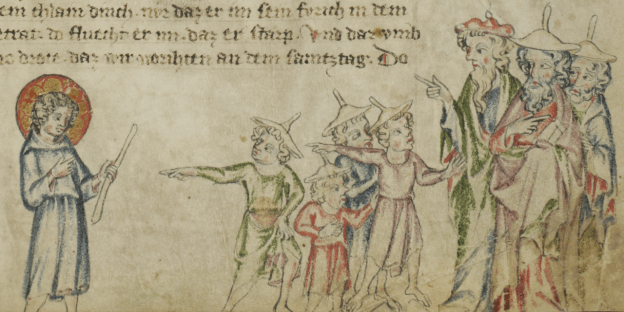Owen here…
One of the common arguments that we hear in favor of the existence of a deity is that it is the best explanation for the human capacity to recognize the difference between good and evil. A corollary of this argument is that without the existence of a deity there can be no objective determination of good and evil or right and wrong (going forward I will refer to these together as the “argument from morality”). So the conclusion is that a deity must exist. What do we make of this? Well, its really a bad argument, and if we unpack it a bit I think we can expose some of it’s flaws.
1. Let’s say that there is such a thing as a deity, and that deity has determined on his (her/it’s) own what was good and what was bad. If this is the case, then if we take the question up one level, we find that morality outside of the deity would still have no objective basis. Morality in this construct would be nothing more than the whim of a deity, which is certainly not objective.
2. This brings us to the alternative of the case I was just discussing above. If we consider the concepts of good and evil as transcendent from a deity, where good and evil are independent of that deity’s will or desire, then we find the logical contradiction that the deity has limits on what he (she/it) can control. This would really be a contradiction of what it would mean to be a deity. We would be forced to redefine what it would mean to be omnipotent if we relied on this construct.
When we consider points 1 and 2 in combination we find a paradox that lacks any reasonable escape. This seems to be pretty sound reasoning that defeats any argument from morality, but there are some other things that we can explore while we’re thinking about it.
Christians love to tell us that their deity is merciful and loving. We’re told in John 3:16 just how much love the god of the Bible had for the world in sending down his son to die for all of us. We’re told that the moral example set by Jesus is another strong argument in favor of Jesus’s divinity and in favor of the truth of the Christian message. What do we think of that? To frame the question directly, what do we really find when we evaluate the behavior of the Christian deity as depicted in the Bible? What does the Bible tell us to look for when love is present? I find the Apostle Paul’s description of love to be one of the most beautiful pieces of prose on the subject of love that I’ve ever come across, so I’ll quote from 1 Cor 13:4-7 (NLT translation because I thinks it’s rendered most poetically):
“4 Love is patient and kind. Love is not jealous or boastful or proud 5 or rude. It does not demand its own way. It is not irritable, and it keeps no record of being wronged. 6 It does not rejoice about injustice but rejoices whenever the truth wins out. 7 Love never gives up, never loses faith, is always hopeful, and endures through every circumstance.”
3. This bring me to my third point. Let’s play a game. Let’s do a simple substitution of the name Yahweh in place of the word love in this passage, and let’s ask ourselves if the statements are true when we restate each sentence that way.
Yahweh is patient and kind. Is this true? No, Yahweh is quick to anger, he hardens many hearts throughout the entire bible, and orders the deaths of many people or just kills them himself outright.
Yahweh is not jealous or boastful or proud or rude. Do we find that to actually be true? No, we don’t. Yahweh says explicitly that he’s a jealous god. At one point in the Old Testament he even says his name is jealous (Exodus 34). He is the great I Am, and he’s certainly proud of it.
Yahweh does not demand his own way. Is that a true statement? No its not. And he has a lake of fire to prove it. He explicitly commands the Israelites right there in the very first commandment to have no other gods before him.
Yahweh is not irritatable, and keeps no record of being wronged. Is this a true statement? No, quite the opposite. Yahweh is continuously angry with the Israelites for rejecting him, and our names are all being taken down in the book of life.
Yahweh does not rejoice about injustice but rejoices whenever the truth wins out. Is this a true statement? I guess it would have to depend on whether you think it was just to drown an entire world in a temper tantrum. I’ll vote no on this one but your mileage may vary.
Yahweh never gives up, never loses faith, is always hopeful, and endures through every circumstance. Can we say this is true? Definitely not. A deity that never loses faith would not drown every living thing on the planet save for a boat full of people and animals.
So when we look at the question of good behavior and we try to evaluate Yahweh using the lens that Paul gives us in his letter to the church in Corinth, what do we find? We find that Yahweh exhibits the very opposite of what we are told to expect from good and loving behavior. Christians always object to a human passing judgment on Yahweh, but hypocrisy is wherever you find it. As a side note before I move on, it’s a fascinating observation that one of the very early schools of Christian thought, as postulated by Marcion of Sinope, was that the deity referred to in the Old Testament was actually a different deity than the father of Jesus. This tells us that as early as the first half of the second century, some Christians had already noticed the contradiction between the vindictive tyrant of the Old Testament and the loving deity depicted in the gospel narratives, and were trying to adapt their theology to account for it. But there is an even better explanation: the stories in the Old Testament are made up and that Yahweh doesn’t actually exist. In any case, at this point the argument from morality has a number of flaws. But wait…there’s more.
4. The argument from morality assumes that no naturalistic mechanism could explain why humans do in fact seem to have a conscience. If our sense of right and wrong didn’t get put into us by a deity then where could it have come from? The answer is that the human conscience evolved over millions of years as a consequence of natural selection. The ability of an early human or proto-human to be able to see and recognize suffering in others and to be able to take steps to reduce that suffering where possible would have conferred a survival advantage on that population. This makes perfect sense. In fact, when we look at other primates we see some forms of group altruism in action. Since there is a plausible explanation for how the human conscience came to be I find the appeals to a deity to be unnecessary.
5. The last argument I will make here is that there is no reason why right and wrong or good and evil have to be transcendent. The use of the adjective “objective” to described morality is not really meaningful at all. The fact is that our standards of behavior are mutually agreed to in a social context, have continued to be refined over time, and will continue to be. Steven Pinker has written much on the subject in his excellent book “The Better Angels of our Nature” and I can’t say it any better than he could, so please consider my recommendation to read that for yourself if you haven’t already. The arguments that theists make that without a deity morality is nothing other than what we’ve all agreed to is just nonsense, and ignores the fact that we are motivated by our evolved consciences and by our understood commitment to each other to do as little harm as possible to ourselves or others. Atheists all over the world wake up every morning and behave properly, so we know no theistic belief is necessary in order to be a decent human being.
So what have we explored here? First we looked at the contradiction that results immediately when one makes the argument from morality. Either good and evil are nothing more than a fiat by a deity, making them the opposite of objective, or they are transcendent, making the deity something other than omnipotent. Next we considered whether we find the god of the Bible behaving in a way that we would expect if he were in fact the source of all goodness and virtue. In this exercise we made use of the New Testament itself in order to ask ourselves if Yahweh rose to the standard laid out by the Apostle Paul, and we found that in every single case Yahweh does not meet the standard. Next we considered where morality could have come from if it didn’t come from a deity and we found that a natural explanation was entirely plausible. Finally we considered the the question of whether using the word “objective” to describe morality is really meaningful at all, and we found that it isn’t. So the very underpinning of the argument from morality is a flawed premise. You can pick any reason you like, but I think we can see that an argument in favor of the existence of a deity on the basis of morality can be dismissed.









